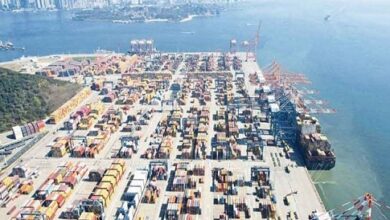Independent Kurdistan far from done deal

Al Ser Syyed Ahmed-
The picture seemed bleak from the very beginning. The announcement of the Islamic State (IS) and Iraqi Kurdistan’s accelerated pace towards secession forewarned of dark days ahead for the region, known for its large oil reserves. The relationship between geopolitical developments and energy is correlated, for whenever the political and security situations worsen, oil prices rise as a result of real or perceived fears about supply disruptions.
But, the oil market has remained relatively stable since the world’s rude awakening early last month to the Islamic State’s takeover of Iraq’s second largest city, Mosul; the organization’s subsequent advance on the ground; and its announcement of the establishment of the caliphate. As a result, the price of crude oil increased by 5% per barrel, compared with the 22% rise during the Libyan revolution.
Consequently, the oil market did not witness the price swings that occurred following pivotal events in the region, such as the 1973 Arab-Israeli war, which led to the first oil shock, when the price per barrel quadrupled, or the second such shock, following the Iranian Revolution, when the price per barrel surpassed the $40 mark for the first time in history. This prompted everyone to be less concerned with the actual price than with securing supplies, particularly considering that Iran, at the time, was the second-largest OPEC producer of oil and in the absence of alternative supply sources, such as Alaska, the North Sea and other producers.
This time around, the market reaction has been largely subdued, as it has grown accustomed to dealing with Middle East unrest. Three factors now allay concerns. First is the growth of domestic production of oil and gas in the United States, which consumes one of every four barrels of oil consumed worldwide. As a result, any reduction in supply … to the largest consumer and importer of oil in the world would encounter a situation that has changed today due to the rise in domestic production.
Second, Saudi Arabia, and to a lesser extent Kuwait and the United Arab Emirates, still possess excess oil production capacities with which they can compensate for other producers’ supply shortages. In this regard, Saudi Arabia produces today a little less than 10 million barrels per day, which means that it possesses an excess production capacity of over 2.5 million barrels per day, despite the fact that some experts questions whether it is capable of producing 12.5 million barrels per day, and for how long. As such, levels of production volumes have never been tried. The third stability factor, at least for the time being, is connected to the developments in Iraq.
Kirkuk’s oil
Although the oil industry suffered from the embargo, as well as from a lack of security and political stability during the past decades, the latest developments have imposed a new reality on the ground.
First, Kurdish Peshmerga forces took control of Kirkuk, following the Iraqi army’s withdrawal from the northern regions. Kirkuk’s oil industry dates back to 1927, when the Kirkuk field was discovered and became productive seven years later, with supplies reaching world markets through a pipeline that stretched to Haifa in Palestine, and Tripoli in Lebanon. The field’s production grew to approximately 900,000 barrels per day at the beginning of the last decade, but subsequently dwindled as a result of the poor management of reserves — with production currently hovering around the 260,000 barrel per day mark.
The Baghdad government tried to double the field’s production capacity, and signed, toward that end, an agreement in principle with British Petroleum, which was rejected by Erbil because it considered Kirkuk to be a disputed area, while noting that the latter’s reserves are estimated to top 8 billion barrels.
On the other hand, Iraqi Kurdistan’s total current oil production averages 200,000 barrels per day, and is expected to double to reach 400,000, if the pipeline that it built to Turkey comes online. Furthermore, Erbil is planning on increasing its production capacity to 1 million barrels next year, and to 2 million barrels within five years. But, all these plans depend on proper marketing, Turkey’s compliance and non-objection on the part of Washington.
In this regard, estimates indicate that Kurdistan possesses oil reserves amounting to 45 billion barrels, placing it 10th globally in terms of reserves, if it ever became an independent state. But, contrary to OPEC countries with large reserves, such as Saudi Arabia, Venezuela and Iran, Iraqi Kurdistan’s government allows foreign companies to operate on its land, with the list of these companies including energy giants such as France’s Total, and Exxon Mobil and Chevron from the United States, among others. In addition to huge reserves, these companies are tempted by favorable production-sharing agreements, and the fact that Iraqi oil in general, including oil in Kurdish areas, is easy to extract, with well-established oil field locations.
The political factor
Still, the political factor remains the main hurdle before any anticipated launch of the Kurdish oil industry, for Baghdad objects to the matter, as does Washington, which does not want to see Iraq partitioned. In this context, it is important to monitor whether Israel will contribute in pressuring Washington to change its position, under the pretext that the latest developments in Iraq have left the country in a de facto divided state.
In practical terms, attention will remain focused on the Turkish position, which is the weightiest. On the one hand, an increase in Kurdish oil exports will bolster the developing Turkish economy, with Turkey being the only gateway for Erbil to world markets. In addition, Ankara relies on foreign sources to supply it with 90% of its petroleum needs. But, the greatest concern for Turkey is that a Kurdish state [in Iraq] might tempt Turkish Kurds to follow in the footsteps of their Iraqi brethren. Noteworthy here is that Kurdish leader Massoud Barzani’s call for a referendum on the province’s independence was welcomed only by Israel — an Israeli enthusiasm that Washington and Ankara view with suspicion and which bolsters their conviction that the experience underway with Iraqi Kurds might repeat itself with the Kurds of Turkey.
On the other hand, what occurred in Mosul will lead to two additional repercussions: The Baghdad central government will be compelled to divert all its exports south through the Gulf, while Turkey, whose oil and gas needs are increasing, might not find any recourse but to cooperate with the Erbil government on the issue of oil, and abandon its reservations against allowing Kurdish oil exports to pass through its territories. Turkey objected to this plan out of fear of angering Baghdad, which considers any such exports to world markets illegal if they occurred without its approval.
Such a scenario actually took place when the first exported Kurdish oil shipment abroad remained stranded in world ports for more than a month, until it was bought by an Israeli importer. Since Kurdistan is landlocked, any state established there will have to rely on oil for its survival, as well as on Turkey, which is considered to be the gateway to the world for that landlocked state possessing no refining capabilities or traditional marketing avenues for its oil. To a large extent, this makes it hostage to the Turkish position. Furthermore, these problems will reduce the willingness of companies to invest in Kurdistan, for it is unclear how they might benefit and recuperate these investments in the absence of tried marketing avenues for Kurdistan’s oil.
Questions
Does Kurdistan intend to seize this “once in a lifetime opportunity,” even if by gradually creating a new fait accompli, or is it cognizant of the regional and international limitations against such a move? As a matter of fact, it is threatening to secede to secure more power to administer its own affairs and dispose of its oil wealth while remaining part of a unified Iraq.
But, with respect to the repercussions of the events in Iraq on the oil industry, the International Energy Agency expects OPEC to increase its production capacity by more than 2 million barrels per day, pushing said production to 37 million barrels per day within five years, with 60% of that increase expected to come from Iraq.
While the current turmoil might hinder Iraqi plans to increase production, southern fields seem secure due to their location in predominantly Shiite areas. Furthermore, both Baghdad and Erbil have the desire and the motivation to increase their oil production and reap financial rewards enabling them to maintain their political and military stances.
These factors limit the repercussions of Iraqi events on the oil market, at least for the foreseeable future, and according to information at hand.
Assafir Lebanese News Paper




